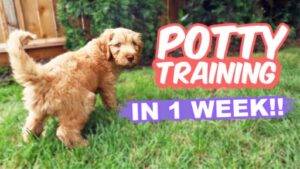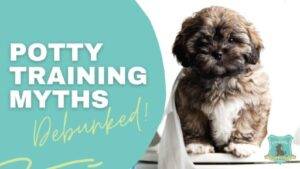Puppy potty training is an essential step in the process of raising a happy and healthy canine companion. It requires patience, consistency, and a solid understanding of your puppy’s needs. In this guide, we’ll provide you with comprehensive tips and strategies to help you successfully potty train your new furry friend.
Establish a Routine

- Dogs thrive on routine and predictability. Set specific times for feeding, playtime, and potty breaks.
- A consistent routine helps your puppy learn when to expect bathroom breaks.
Watch for Signs of Needing to Go
- Puppies often exhibit signs like sniffing, circling, or becoming restless when they need to relieve themselves.
- Pay close attention to these cues and take them outside immediately.
Frequent Potty Breaks
- Young puppies have small bladders and need to go out more frequently. Aim for every 1-2 hours during the day.
- Extend the time gradually as they get older and their bladder capacity increases.
Establishing a Designated Potty Area
Choose a Specific Spot
- Select an area in your yard where you want your puppy to do their business.
- The scent left behind will encourage them to return to the same spot.
Consistency is Key
- Always take your puppy to the same spot for potty breaks to reinforce the behavior.
Avoid Playtime During Potty Breaks
- Keep potty breaks focused on the task at hand. Save playtime for after they’ve done their business.
Positive Reinforcement
Use Verbal Praise
- When your puppy successfully goes potty outside, offer verbal praise like “good job” or “well done.”
- Use an enthusiastic tone to convey your approval.
Treats as Rewards
- Small, tasty treats can be a powerful motivator for puppies. Offer one immediately after they’ve finished.
Consistent Positive Reinforcement
- Reinforce good behavior every time to create a strong association between going outside and positive feedback.
Handling Accidents

Stay Calm
- Accidents are a natural part of the learning process. Avoid scolding or punishing your puppy.
Clean Thoroughly
- Use an enzymatic cleaner to eliminate any lingering scent that might attract your puppy back to the same spot.
Reinforce Training
- Revisit the basics if accidents become frequent. It may indicate a need for more consistent training.
Special Considerations
Weather and Temperature
- Be mindful of extreme weather conditions. Provide a sheltered area or use puppy pads indoors if needed.
Health Concerns
- If your puppy suddenly starts having accidents after initial progress, consult a vet. It could be a sign of a health issue.
Be Patient and Persistent
- Every puppy learns at their own pace. Stay consistent and positive throughout the process.
Puppy potty training is a crucial aspect of responsible pet ownership. By understanding your puppy’s needs, providing positive reinforcement, and being patient, you’ll set the foundation for a well-adjusted and happy companion. Remember, consistency is key, and with time and effort, you and your puppy will succeed in this important training endeavor. Happy training!

